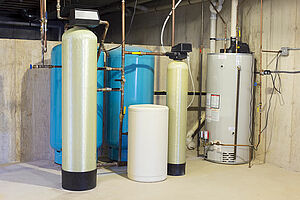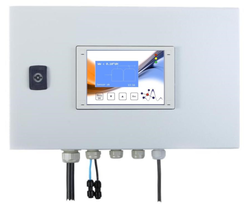quality-controlled regeneration triggering
products OFS GmbH - advantages

As a rule, water softening systems work according to the ion exchange process. This means that the cations contained in the water, such as calcium and magnesium ions, are replaced by sodium ions. When the ions have been completely exchanged, the water softener is regenerated by rinsing it with saline. The water softener can be renewed depending on the time, quantity or quality. In most cases, the quantity-controlled regeneration of the softener is selected for industrial systems. This can have disadvantages. The rinsing process requires plenty of salt and water. The consequences are unnecessarily high operating costs and resource consumption with fixed control of process reliability.
OFS GmbH therefore relies on process reliability with qualitatively triggered regeneration of the softener. These special products have been developed for the intelligent control and monitoring of the water softener. Softcontrol RM and SaveCost C are online water hardness measurement systems for monitoring residual hardness, as well as for reducing resources and costs of a water softener. In contrast to conventional water hardness monitoring devices, the soft control devices from OFS work with an ion-selective sensor for calcium and magnesium ions. The water hardness measurement of the soft water takes place without the use of chemicals and without the addition of indicators or reagents. The difference process between raw and soft water enables automatic self-monitoring and sensor calibration. This means that the device is self-sufficient and maintenance-free apart from a displayed sensor change.
The regeneration of the connected water softener is triggered quality-controlled. The consumption of salt and rinsing water is significantly reduced, which saves resources and is sustainable.

The regeneration of the softener triggered by quality results in several advantages:
- The soft control systems from OFS ensure operational safety. They monitor the hardness concentration in the soft water and are the 'guards' of every water softener.
- The soft water throughput is significantly higher at up to 60 percent compared to the volume-controlled operation of the water softener.
- The consumption of resources for salt and rinse water is reduced by up to 60 percent.
- The regeneration of the water softener takes place only after the resin is completely exhausted. This results in an enormous savings potential in operating and maintenance costs.
- The longevity of the water softener is significantly increased.
- In short: softeners with quality-controlled regeneration work in an environmentally friendly, sustainable and cost-effective manner. OFS offers the necessary control units for this.





